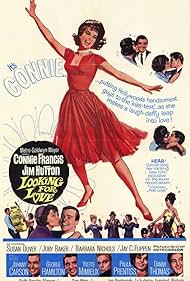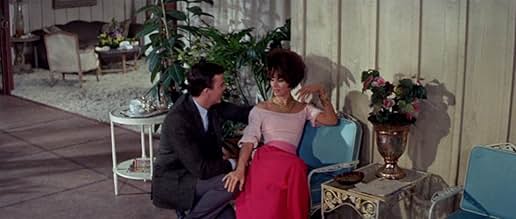Connie's third of her four musical comedies for Metro and the only one that doesn't have the word 'boy' in the title. By 1964, Hollywood had pretty much thrown in the towel as far as television was concerned and began openly sleeping with the enemy. Not only is the film crammed with popular personalities of the day (Johnny Carson, Danny Thomas, Jesse White, Joby Baker), and cute (overly-rehearsed) on-set mishaps, the structure, pace and composition are strictly small-screen. It's easy to understand how screenwriter Flippen (wife of Jay C.) would eventually write on such ground-healing 60's pigswill as "The Brady Bunch" and "The New Scooby Doo Movies." What's truly tragic is that these TV-safe anamorphic frames, crowding characters to the center, were lensed by Minnelli mainstay Milton Krasner.
Stardom eluded Libby Caruso (Francis) for an entire month, so she decided to get out of the music business and snare a man. Aside from her voice and her Lady Valet, a glorified clothes hanger she invented, Libby's only talent is sniffing out Mr. Right. Enter Jim Hutton, a co-worker into TNT (Tall 'n' Top-Heavy) who lands Libby a spot to tout her creation on the Tonight Show. It's a flop, but her singing connects and for another hour we watch Libby slalom her way around a light powder of familiar supporting players in search of true love.
The film was made to cash in on the success of earlier Francis/Hutton vehicles, most notably the enormously entertaining, guiltiest of all guilty pleasures, "Where the Boys Are." As sociologically and cinematically backwards as that film is, it plays like a sophisticated Lubitsch romp compared to this set-bound stiff. We briefly get to visit a neon drenched sixties supermarket only to be shuttered back in the studio after one establishing shot. "Where the Boys Are?" alumni George Hamilton, Yvette Mimieux and the vastly underrated Paula Prentiss appear, adding little more than name recognition to the poster.
Connie Francis was a firecracker. She had the neurotic frailty of a young Judy Garland, Ethel Merman's pipes and the comedic traction of a Danny Thomas. Well, two out of three ain't bad. Pert and delightfully ditsy in the light comedy (comedy-lite?) passages and capable of showing her range even in trash like this, she could have been a contender had it not been for that tragic night in a Howard Johnson's motel room.
Director Don Weis has come through in the past, but this time he's simply punching Metro's time-clock. Impress me once, good for you. Disappoint me after an imposing start and I'll probably still keep giving you the benefit of the doubt in hopes of a return to form. Who do you think brought me to junk like this?
























